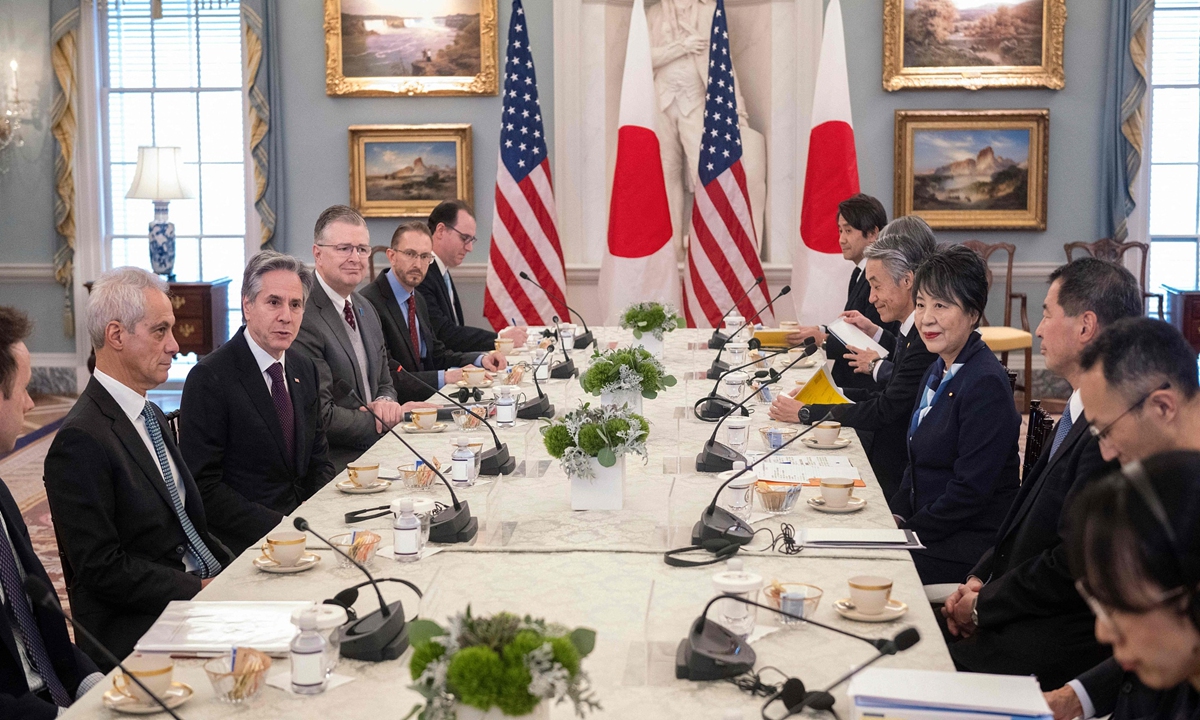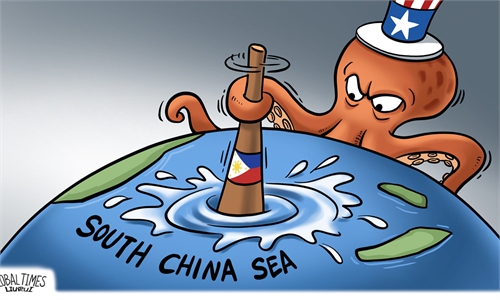Japan eyes dangerous trilateral partnership with US, Philippines to contain China in diplomacy paper

US Secretary of State Antony Blinken (3rd L) meets with Japan's Foreign Minister Yoko Kamikawa (4th R) at the State Department in Washington, DC, on January 12, 2024. Photo: VCG
In the annual Japanese foreign policy paper, details of which were revealed by Japanese media on Thursday, the country looks set to continue its hawkish tone toward China, while focusing more on boosting trilateral ties with the US and the Philippines in an attempt to contain China's peaceful development.
Chinese analysts warned that cooperation between the US, Japan, and the Philippines may potentially become a fixed routine in the future with Japan's real intention to expand its own military and realize a constitutional revision.
They urged Japan, which has been a significant beneficiary of a peaceful and prosperous Asia-Pacific region for decades, not to engage in US-led efforts to split and militarize the region, as this would undoubtedly harm Japan's overall interests.
Their remarks came after Kyodo News, citing a draft of Japan's annual foreign policy report on Thursday, revealed that Japan will emphasize the importance of boosting collaboration with the US and the Philippines to counter China's actions in the Asia-Pacific region.
The Diplomatic Bluebook for 2024 said "China has been continuing and intensifying its attempts to unilaterally change the status quo by force" and "military activities" in waters surrounding Japan, including the South and East China seas.
Such moves by China have put Japan in "the most severe and complex" security environment and should be addressed by collaborating with like-minded nations, not only its close security ally the US, but also the Philippines, Australia and South Korea, according to the draft obtained by Kyodo News.
In recent years, as tensions between China and Japan have escalated, Japan has upgraded its positioning of China in diplomatic blueprints as well as defense policy documents. Last year, Japan's diplomatic report identified China as the "greatest strategic challenge."
This year, it continues a relatively tough stance and hawkish tone toward China, which is not conducive to overall stability or the healthy development of bilateral relations, and it will hinder economic and trade cooperation and mutual understanding among the people, Da Zhigang, director of the Institute of Northeast Asian Studies at the Heilongjiang Provincial Academy of Social Sciences, told the Global Times on Friday.
In recent years, Japan has been actively pushing for constitutional amendments, with right-wing forces in Japan continuously creating justifications, such as exaggerating external threats and instilling in the public the idea that "Japan should become a normal country" with defense capabilities to protect itself, Da pointed out.
Li Haidong, a professor at the China Foreign Affairs University, criticized Japan for lacking autonomy in its strategic decisions and being dominated by the US in terms of security.
"Objectively speaking, the Asia-Pacific region has enjoyed security and prosperity for decades, with Japan being a significant beneficiary. Japan should not engage in US-led efforts to split and militarize the region, as this would undoubtedly harm Japan's overall interests," Li said.
Regarding trilateral cooperation, the US, Japan and the Philippines have been strengthening their security collaboration in recent years.
Japanese Prime Minister Fumio Kishida is set to meet with US President Joe Biden and Philippine President Ferdinand Marcos Jr. on April 11 in Washington, the first-ever trilateral summit for the countries. They are expected to agree on deeper cooperation, Kyodo reported.
Unlike in the past when Japan relied more on its bilateral alliance with the US, it is now seeking to form multilateral alliances with partners such as the Philippines and Australia, indicating its desire to collectively contain China, Da said.
"Japan's cooperation with the Philippines and the US has evolved from bilateral to multilateral, with discussions on the possibility of joining the assertive military cooperation framework known as AUKUS, which consists of the US, UK and Australia," Da said.
In the context of the China-Philippines territorial dispute, the US, Japan and the Philippines are attempting to pressure China through their alliance, but this approach is unlikely to yield the desired results, Li told the Global Times.
On the Taiwan question, the US is trying to escalate tensions to expedite the formation of an Asia-Pacific version of NATO, with Japan and the Philippines being key players manipulated by the US. This trilateral coordination will significantly worsen the security situation in West Pacific region, Li warned.
Da also predicted that the trilateral cooperation may become a fixed and normalized routine in the future, involving military exercises, island landing drills, joint maritime patrols with other countries and leveraging the Philippines' position in ASEAN to exert influence on other ASEAN countries.


